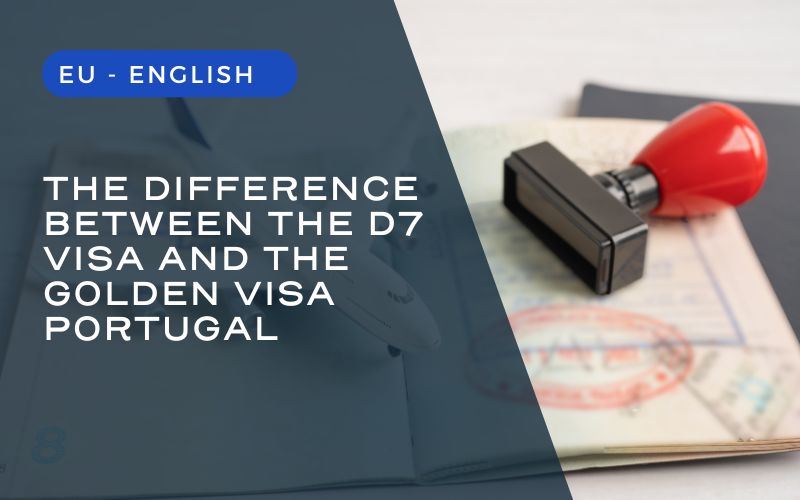The D7 Visa and the Golden Visa Portugal are two different options for those wishing to establish residence in Portugal, each catering for different profiles and objectives.
But they are still easily confused, so it’s important to analyze all the differences and benefits of each option.
In this article we’ll explain what the two visas are, the main rules and advantages and how to understand if your profile is suited to each of them.
Have a good read.
What is the D7 Visa for Portugal?
- The D7 visa, often referred to as a passive income visa, is intended for retirees and people with a regular income in USA who want permanent residence in Portugal.
- This visa is ideal for individuals who can support themselves independently in the country, without the need for local employment.
- The focus of the D7 Visa is on promoting a complete and effective integration into Portuguese life, enabling a deeper and more immersive experience in the country.
- Income holders eligible for the D7 Visa include:
- Holders of passive income from rents and/or;
- Profits and dividends and/or;
- Retirement and/or;
- Religious and/or;
- Copyright holders.
What is Golden Visa Portugal?
The Golden Visa is an investment-based residency program designed to attract foreign investors from outside the European Union.
Unlike the D7 Visa, the Portuguese Golden Visa is flexible on the requirement to stay in the country, ideal for those who do not wish to move permanently.
Profile of eligible candidates
D7 Visa
This visa is aimed at individuals with a proven passive income, such as pensions or rental income.
Proof of financial capacity to support oneself and dependents in Portugal is a fundamental requirement for applicants for this type of visa.
To obtain the D7 visa, you must prove:
- a minimum income of 100% of the Portuguese minimum wage for the main applicant;
- plus 50% of that amount for the spouse;
- 30% of the current minimum wage for each additional dependent.
In addition, the applicant must be willing to establish roots in Portugal, as this visa requires a longer stay in the country.
Golden Visa Portugal
The Golden Visa is intended for international investors interested in making significant financial contributions in the country, including investments in venture capital funds or other forms of substantial economic contribution.
Currently, to obtain the Golden Visa in Portugal, you need to make one of the following investments:
Capital transfer of at least €500,000 for scientific research activities.
€500,000 to be invested in Portuguese investment or venture capital funds aimed at capitalizing Portuguese companies, excluding the real estate sector.
Setting up a company or increasing the share capital of an existing company with €500,000.
Transfer of capital of at least €250,000 for artistic production or the restoration of cultural heritage.
Creation of at least 10 jobs.
This profile of applicant is generally made up of people who are looking, in addition to the benefits of residence, for the security of a solid investment and the mobility advantages offered by access to the Schengen area.
Length of stay in Portugal with a D7 Visa and Golden Visa
For the D7 Visa, the income holder will receive a residence permit initially for a period of two years, and two every 3 years on each renewal.
According to Portuguese law, during the validity of each period of residence, the holder can be absent from Portugal for six months, or eight months in between. This shows that the acquisition of the visa takes into account the fact that you will be in Portugal for most of the time.
This length of stay is intended to ensure that the individual is truly integrated into Portuguese society and contributing to the local economy.
The Golden Visa, on the other hand, is extremely flexible, requiring only that the applicant spend seven days in the first year of the valid residence permit, and 14 days in subsequent years.
This flexibility is one of the main attractions of the Golden Visa, and one of the great differentials with other Portuguese visas. It is ideal for those who do not wish to commit to a permanent move, but who want to maintain a connection with Portugal and enjoy the benefits of residency in the European Union.
In this way, by obtaining the Golden Visa, the holder can continue to live in USA, and it also guarantees that the time to acquire Portuguese citizenship will count after 5 years.
Visa benefits and rights of residence
The D7 Visa provides full access to the health system, public education and other social services in Portugal, as well as allowing the holder to work in the country, as long as the Portuguese government is informed.
The Golden Visa offers the same rights of residence, but without the need for continuous stay, making it more advantageous for those who just want a foothold in Europe without committing to permanent residence. With the Golden Visa, the holder and their family have the right to move freely around the Schengen area and enjoy the benefits of living in Europe without the stricter residency requirements.
As we’ll discuss below, both visas make it possible to acquire Portuguese citizenship, as long as you keep your residence permit valid for 5 years. It is important to note that in the case of the D7 Visa, proof of passive income will be required again when renewing the visa, and in the case of the Golden Visa, it is necessary that the investment made is maintained for 5 years.
Path to Portuguese citizenship
Both visas allow access to Portuguese citizenship after five years of legal residence.
The D7 Visa requires continuous residence, and it is no longer necessary to meet additional integration requirements, such as knowledge of the Portuguese language and effective ties with the local community.
The Golden Visa does not require continuous residence, but only the minimum stay requirement.
The flexibility of the Golden Visa allows investors to maintain their global interests while qualifying for citizenship of a European country, offering a significant strategic advantage for those seeking international mobility options.
Application process and required documentation
Proof of passive income is required for the D7 visa, as well as health insurance, proof of accommodation in Portugal and a criminal record certificate. In addition, the applicant must demonstrate that they have adequate accommodation, which involves proving a rental contract or ownership of a property.
For the Golden Visa, the documentation involves proof of the investment made, such as bank documents proving the financial transaction, as well as the need to obtain a tax number and open a local bank account.
The Golden Visa application process can be simpler in some respects, as it doesn’t require proof of ongoing income, but it does require the investment to be made before the application process begins, which implies a significant financial commitment right from the start.
But which visa should you choose: the D7 Visa or the Golden Visa Portugal?
The choice between the D7 Visa and the Golden Visa depends on the individual objectives and financial circumstances of each applicant.
The D7 Visa is ideal for those who wish to establish residence in Portugal on a continuous basis, especially retirees or individuals with passive income who are looking for a permanent move.
It provides full integration into Portuguese society, including work and access to social services, allowing the holder to establish a deep connection with the country.
The Golden Visa, on the other hand, is recommended for investors looking for a flexible residency option, without the need to move to Portugal permanently. This option is particularly advantageous for those who want to obtain the benefits of a European residence regime while maintaining their professional or family activities elsewhere.
Each of these alternatives has its own benefits, and the right choice will depend on the applicant’s priorities and lifestyle.


